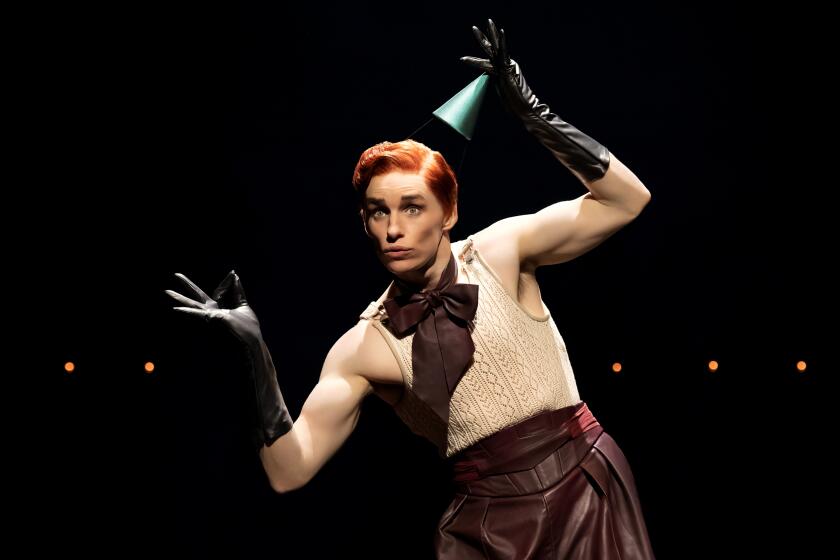Review: Playwright Jackie Sibblies Drury daringly deconstructs the theater of black identity in ‘Fairview’ at Berkeley Rep
Something is intentionally askew about the opening scene of “Fairview,” Jackie Sibblies Drury’s blazingly inventive new play, which is now at Berkeley Rep after setting New York abuzz last summer. But it takes a little time to figure out the nature of the theatrical mischief that’s afoot.
The production, directed by Sarah Benson, artistic director of the little powerhouse Soho Rep, which co-commissioned the play in this joint world premiere with Berkeley Rep, flirts with pastiche without falling into parody. Drury, author of “We Are Proud to Present…” (to abbreviate a title that flows like the Nile) is once again venturing into heady meta-theatrical terrain.
On first encounter, the characters of “Fairview” seem derivative of some 1990s sitcom about a well-off black family. The Frasiers aren’t the Huxtables, but they seem to have taken their lifestyle cues from “The Cosby Show.”
Beverly (Natalie Venetia Belcon), who likes everything just so, is preparing a feast in honor of Mama Frasier’s birthday. As she orders Dayton (Charles Browning), her attentive husband, to help out with last-minute details, the doorbell rings and in walks Jasmine (Chantal Jean-Pierre), Beverly’s sassy sister who has an opinion on everything. Aunt Jasmine even has a little advice on how to raise Keisha (Monique Robinson), Beverly and Dayton’s college-bound daughter, who’s starting to buckle under the weight of her family’s expectations.
Jasmine’s all-encompassing knowledge comes from having watched so many movies. “You know, one of those movies that’s a family drama where somebody dead, and what to do with the children, or somebody dead and what to do with the wife, or somebody dead and the house ain’t paid for,” she explains while butting further into Beverly’s business.
Audience members indoctrinated by television, which is to say the vast majority of the American public, might assume that they’re on safe comic ground. But there are clues that the play is going to careen away from the familiar.
The biggest hint is the set by Mimi Lien that frames the household as a generic portrait in middle-class respectability. The decor, which might as well have quotation marks around it, is drained of individual character. The layout suggests an anonymous model home in a housing development aimed at the upwardly mobile.
Lien, the first set designer ever to be named a MacArthur “genius” fellow, ingeniously arranges her scenic design at a critical angle. The entire play seems to be viewed from a downstage corner of the stage, where the characters check how they look in an invisible mirror.
Hanging on the imaginary fourth wall from which an audience is traditionally granted its privileged view, this mirror seems to be of the kind used for security purposes to prevent shoplifters and the like. Theatergoers clearly aren’t the only ones peeping into the Frasier residence.
As the actors playing the family members quietly reprise their first scene in the second act, the voice-over commentary of a group of unseen onlookers resounds. A male voice insistently poses versions of the same question: “If you could choose to be a different race, what race would you be?”
Surmising that these speakers are white doesn’t require much detective work. The fetishization of the Frasiers’ blackness is a dead giveaway.
As the play moves into its third and strangest phase, the line between virtual reality and reality itself blurs. Those nattering racial tourists (played by Brooke Bloom, Natalia Payne, Jed Resnick and Luke Robertson) eventually invade the Frasier household in a playwriting maneuver that’s part absurdist, part near-term futuristic.
The subject of surveillance and black bodies is especially charged today, but Drury’s play harks back to a time before Facebook and MAGA hats, when black intellectuals such as James Baldwin and Frantz Fanon were teasing out the connections between racism and cultural representation. “Fairview,” a 21st century play with a radical 1960s soul, deconstructs the warping power of the white gaze.
Drury’s adventurous form invites comparison with Jean Genet’s “The Blacks: A Clown Show.” But “Fairview,” which blasts R&B classics and at one point breaks into the Hustle, is less aggressively abstract. And as the play zooms in on the interior experience of Keisha, who’s trying to understand the crazy game imposed on her family, the influence of the great dramatic poet Adrienne Kennedy (“Funnyhouse of a Negro,” “A Movie Star Has to Star in Black and White”) bleeds through.
“Fairview” is more impressive in its conceptual brilliance than in its antic execution. The play has a hurtling energy that is thrilling yet also a little blurry at times. Some of the blurriness is intentional. The play’s final movement, which reverses the positions between spectator and spectacle, is fueled by Keisha’s desperation to understand her life apart from the projections of a ubiquitous white audience.
Finding myself standing on the stage with other white theatergoers at the end of “Fairview,” I felt both socially implicated and artistically exhilarated. Audience members of color remained in their seats. One woman I spotted had tears streaming down her face and an expression of what looked like gratitude.
“Fairview,” which runs at Berkeley Rep through Nov. 4, really ought to be produced in Los Angeles. (The Kirk Douglas Theatre, REDCAT and Geffen Playhouse’s Audrey Skirball Kenis Theater would all be suitable.) The play is dangerous, no doubt about it, but it’s also enlightening and provocatively fun.
Benson’s production, which has a few of the same actors who performed the play under her direction at Soho Rep, is a wild ride that makes giddy use of Sly and the Family Stone’s hit “Family Affair.” The choreography by Raja Feather Kelly, aided by Amith Chandrashaker’s lighting and Mikaal Sulaiman’s sound design, turns social critique into a vibrating dance party.
It is rare these days to encounter a dramatic performance that unfolds like a work of conceptual art. But Drury wrestles with theatrical structures to give us a fairer view of a society that for too long has been practicing another form of mass-incarceration — this one through stereotypes.
Follow me @charlesmcnulty
More to Read
The biggest entertainment stories
Get our big stories about Hollywood, film, television, music, arts, culture and more right in your inbox as soon as they publish.
You may occasionally receive promotional content from the Los Angeles Times.







